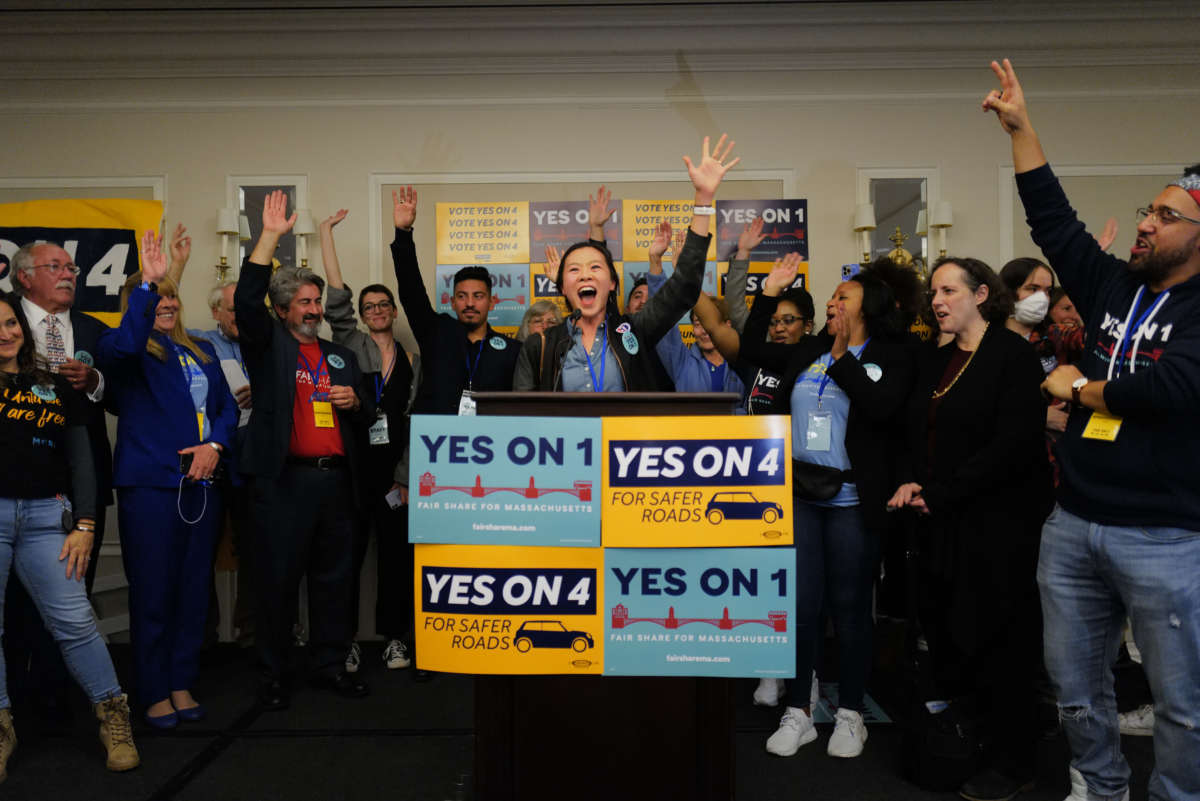Support justice-driven, accurate and transparent news — make a quick donation to Truthout today!
Americans are sick and tired of seeing CEO pay and billionaire wealth in the stratosphere while working families are struggling with soaring costs. This election day, voters in several states used direct democracy to do something about it. They voted to hike taxes on the wealthy, raise wages and build union power, help ordinary people afford basic necessities, and tackle the problem of big money in politics.
Massachusetts Hikes Taxes on the Rich
Sixth time’s a charm. Massachusetts fair tax advocates had tried and failed five times since 1962 to undo the regressive flat income tax rate embedded in their state constitution. This time they were victorious. By a 52-48 margin, voters approved an income surtax of 4 percent on annual individual income above $1 million, with revenue going mostly towards public education and transportation.
In the months before the election, with polls showing the initiative was popular with the electorate, opponents launched a big propaganda campaign. They argued the measure would lead to an exodus of rich taxpayers, double the taxes of tens of thousands of residents, and slam middle class families with a huge tax burden if they sold their homes. Fortunately, voters were not swayed by this misleading messaging.
“Massachusetts voters support a fairer tax system, and greater, more stable investment in transportation and public education,” Fair Share Campaign Manager Jeron Mariani said in a statement. The surtax is expected to generate an additional $1.2 billion to $2 billion per year.
A corporate-backed “tax the rich” proposal, Proposition 30, failed in California after Governor Gavin Newsom and others slammed it as a giveaway for Lyft. The rideshare company, which stood to benefit from electric vehicle subsidies funded through the tax, spent $45 million on the campaign.
Nebraska and Nevada Raise State Minimum Wages
With Republicans continuing to block a raise in the federal minimum wage, advocates in Nevada and Nebraska took the issue directly to voters and won handily.
In deep red Nebraska, they won a state minimum wage hike to $15 an hour by 2026, up from the current $9 an hour. The National Employment Law Project and the Economic Policy Institute estimate this action will benefit about 150,000 Nebraskans.
Nebraska voters passed the measure by a 58-42 margin while also re-electing Republican members of Congress who’ve opposed federal minimum wage increases. Rep. Adrian Smith, who had blasted President Biden’s $15 federal minimum proposal as “economically harmful,” garnered 78 percent support.
In Nevada, voters approved a state constitutional amendment to increase the minimum wage to at least $12 an hour by 2024 and eliminate a loophole that has allowed companies offering health benefits to pay their workers less than the state minimum. Greedy employers have taken advantage of this two-tier system by paying lower wages while offering only shoddy insurance that many workers couldn’t even afford.
Illinois Guarantees the Right to Unionize
Illinois pro-labor groups built on the momentum of a nationwide unionization surge and the highest public support for unions since the 1960s to garner strong support for a workers rights measure. The constitutional amendment codifies the right to organize and bargain collectively and prohibits the state government from passing anti-union “right-to-work” laws, such as those in effect in 27 states.
Final results might take weeks because of the high bar required for a constitutional amendment (60 percent of those voting on the measure or a majority of those voting in the election). But with 58 percent support as of Wednesday, victory appears likely.
In an op-ed published before election day, Illinois AFL-CIO president Tim Drea explained that inserting these rights in the state constitution “will protect Illinoisans from the whims of any anti-worker politician that may come along in the future.”
DC Eliminates the Subminimum Wage for Tipped Workers
Media that fights fascism
Truthout is funded almost entirely by readers — that’s why we can speak truth to power and cut against the mainstream narrative. But independent journalists at Truthout face mounting political repression under Trump.
We rely on your support to survive McCarthyist censorship. Please make a tax-deductible one-time or monthly donation.
